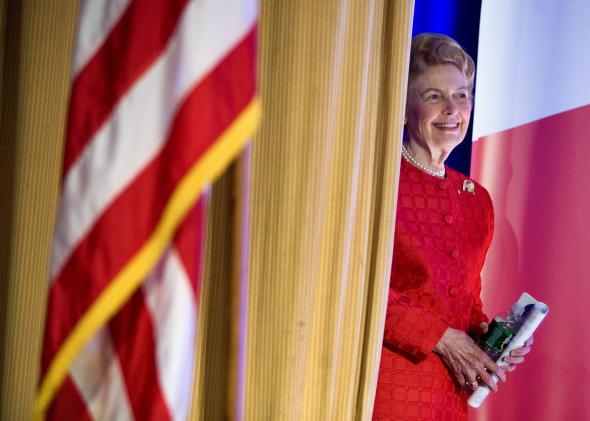In 1967, the conservative operative Phyllis Schlafly ran for president of the National Federation of Republican Women. A highly skilled organizer, she’d been unanimously elected as vice president three years earlier. Yet as Donald T. Critchlow wrote in his 2005 biography Phyllis Schlafly and Grassroots Conservatism: A Woman’s Crusade, GOP moderates were determined to take back the party after the debacle of Barry Goldwater’s 1964 loss, and they mobilized to defeat her.
During the highly acrimonious campaign, Schlafly’s critics argued that as a mother of six children, she couldn’t fully devote herself to a political post. Some slung accusations of child neglect. After an ugly fight, Schlafly lost. Just over a year later she wrote an essay, quoted by Critchlow, about the ways Republicans took conservative women for granted; some of it would fit verbatim in an EMILY’s List appeal. “Women will continue to be ignored in the centers of political power until they hold a substantial percentage of public offices and are elected to party positions,” she wrote.
Schlafly, who died on Sunday, was the most influential anti-feminist in American history. She is singled-handedly responsible for derailing the Equal Rights Amendment. Much of her life, however, could serve as a feminist parable, as she relentlessly maneuvered for power in a male-dominated world.
Though she would become famous for defending housewifery, Schlafly earned a master’s degree in political science from Harvard and ran for Congress in 1952, while her first child was still in diapers. (She beat a mainstream Republican opponent in a primary upset but lost the general.) She was an obsessive anti-communist, concerned above all with national security. Throughout the 1960s, as feminists began to seriously lobby for the Equal Rights Amendment, Schlafly barely gave it a thought, telling her biographer Carol Felsenthal, “I figured ERA was something between innocuous and mildly helpful.”
Like many an ambitious woman before her, however, Schlafly saw an opportunity in gender politics, an area where women have always been able to exercise their talents for leadership. When she entered the fray against the ERA in 1972, it was seen as an anodyne, bipartisan issue; that year, the Senate approved it overwhelmingly. By 1973, 30 states had ratified it. Richard Nixon supported it. Schlafly, however, was prescient enough to see its potential to mobilize people anxious about the rise of feminism and the decline of the nuclear family.
She framed her campaign as a defense of women’s prerogatives; the organization she founded, Stop ERA, doubled as an acronym for Stop Taking Our Privileges. Schlafly warned that women would be forced out of their homes and into the workplace, and that husbands would be able to abandon their wives with impunity. Feeling imperiled and disrespected, housewives rushed to defend their security. A masterful movement-builder, Schlafly turned Stop ERA into a powerful national network that that pressured politicians at both the state and the national level. In 1975, she renamed the group the Eagle Forum.
For many of the right-wing women who joined her crusade, politics became almost a consciousness-raising experience. (Susan Faludi quoted one of them in her classic 1991 book Backlash: “[Y]ou start getting some self-confidence. You beat a lawyer in a debate a couple of times and you start thinking, ‘Well, gee, that’s pretty good. I didn’t know I could do that.’”) As Alan Wolfe wrote in the New Republic, Schlafly “did more to bring the people with whom she agreed into the political process than [Betty] Friedan could ever have dreamed.” By 1980, the Equal Rights Amendment was dead.
Feminists saw hypocrisy in Schlafly’s political drive, but to her, her successes proved feminism unnecessary. Her 1977 book The Power of the Positive Woman celebrated the opportunities that women had already won: “The Positive Woman in America today has a near-infinite opportunity to control her own destiny, to reach new heights of achievement, and to motivate and influence others.”
Yet Schlafly once had ambitions to be taken seriously in the realm of foreign policy and national defense, the subjects of five of her books. In 1965, she co-wrote Strike From Space, a book championing the idea of a space-based missile defense shield. The concept was considered outré at the time, but Ronald Reagan would eventually propose a version of it. Schlafly was rumored to want a post in Reagan’s administration, but apparently she was never seriously considered. To some feminists, her snubbing proved that opportunities for women were not “near-infinite” after all. In a 1982 debate with Schlafly, Catherine MacKinnon argued that the Reagan administration had discriminated against Schlafly on the basis of her sex. In her remarks, which she later published in her book Feminism Unmodified, MacKinnon said:
Mrs. Schlafly tells us that being a woman has not gotten in her way… I do submit to you, though, that any man who had a law degree and had done graduate work in political science; had given testimony on a wide range of important subjects for decades; had done effective and brilliant political, policy, and organizational work within the party; had published widely, including nine books; was instrumental in stopping a major social initiative to amend the Constitution just short of victory dead in its tracks, and had a beautiful, accomplished family—any man like that would have a place in the current administration…She was widely reported to have wanted such a post, but I don’t believe everything I read, especially about women. She certainly deserved a place in the Defense Department.
To be clear, the world is surely a better place because Schlafly never served in the Department of Defense. To say that she was as qualified as many of her high-flying male colleagues on the far right is not to say very much at all. Schlafly’s politics were those of resentment, paranoia, and cruelty. All the same, her thwarted ambitions testify to the fact that spunk and bravado are not substitutes for structural equality. She is doomed to exemplify a truth she railed against. It seems a fitting fate.
